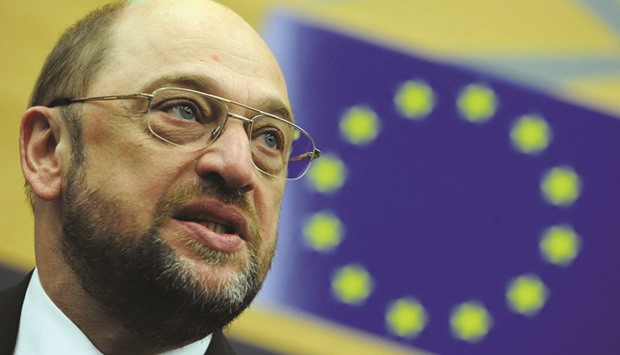Germany’s centre-left Social Democrats (SPD) have moved ahead of Chancellor Angela Merkel’s conservative Christian Democrats (CDU/CSU) in an opinion poll by the Emnid institute for the first time since 2006, Bild am Sonntag newspaper said.
The SPD’s unexpected surge of some 12 points in the last month has caught Merkel and her conservatives off guard, analysts said, just seven months before the September 24 election, where she had expected to win a fourth term easily.
The Emnid poll of 1,885 voters gave the SPD 33% of the vote, up one point in the last week, while the Christian Democrats (CDU) and their Bavarian sister party the Christian Social Union (CSU) would win 32%, down one point.
The SPD has now gained a record-breaking 12 points in the last four weeks, according to Bild am Sonntag newspaper, since former European Parliament president Martin Schulz was named as its candidate to run against Merkel.
“The increase is unmatched in the history of the Bild am Sonntag polls,” the paper wrote.
The SPD, junior partner in Merkel’s ruling coalition, had trailed her conservative bloc for years in opinion polls until nomination of Schulz revived the party.
The Social Democrats last won an election under Gerhard Schroeder in 2002.
“This is a serious poll showing the SPD coming from nowhere to overtake the CDU/CSU,” Thomas Jaeger, a political scientist at Cologne University, told Reuters. “It’s amazing to see how unprepared the CDU was for someone like Schulz ... they assumed the SPD was going to stay stuck in the 20-25 percent range. They’ve been caught pants down.”
On Friday, the Electoral Research Group published an opinion poll for ZDF television showing the SPD at 30% but still behind the CDU/CSU, which was on 34%.
Schulz, a former book-seller without a high school degree, has revitalised the SPD with his straight-talking candour.
He has struck a chord with his promise to campaign for social justice and fight right-wing populism.
Even though the SPD has been junior partner to Merkel’s CDU/CSU in a grand coalition since 2013, Schulz has campaigned against her policies as an outsider with no position inside the government.
“It was completely unexpected the way Schulz has won back over so many former SPD voters who had turned their back on the party,” said Jaeger. “He speaks their language and sounds like one of them. There’s a lot of enthusiasm all of a sudden.”
The Emnid poll in Bild am Sonntag also showed that the SPD would be able to form a left-of-centre coalition with the hard-left Linke party and the pro-environment Greens party.
The Linke were unchanged at 8% and the Greens steady at 7%.
Together with the SPD’s 33%, the left-of-centre coalition would have 48% and enough for a government as small parties fell under the 5% threshold.
The CDU/CSU at 32%, the Free Democrats (FDP) at a steady 6% and the ostracised far-right Alternative for Germany (AfD), down one point to 9%, would have a combined total of 47%.

Schulz (above) was chosen to run against Merkel in September.
